
Text & photos- Lily Maynard Sketches – Michèle M
On July 16th 2018, a group of almost 200 women, and a few men, attended a meeting organised by ‘Woman’s Place UK’ at Jury’s Inn in Brighton.

“We are a group of people from a range of backgrounds,” declares Woman’s Place UK, “including trade unions, women’s organisations, academia and the NHS. We are united by our belief that women’s hard won rights must be defended.”
WPUK believes in the right of everyone, “to live their lives free from discrimination and harassment.” WPUK is concerned with the rights of women and girls, “who face both endemic structural and personal inequality,” and how those rights are affected by current proposed changes to the Gender Recognition Act.
To this effect WPUK has arranged a series of talks around the country, meeting firstly in Cambridge in November 2017, then in Manchester, Bristol, Edinburgh, London, Birmingham, Cardiff, Oxford, Basingstoke,, Newcastle, Todmorden, Hastings, and most recently, Brighton.
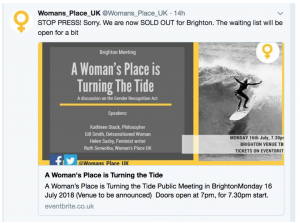
Taking the train down from London for the meeting, I decided to make a day of it and go for a swim in the afternoon. Siri informed me that high tide would be at two so I planned a swim for three.
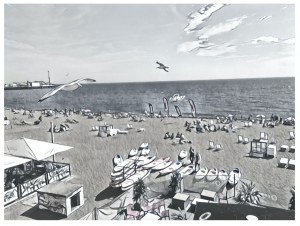 The beach was crowded and the stones were hard underfoot but the water was dark blue and perfectly chilled. I buried my phone and cash in a plastic bag under my towel and stepped into the icy water. I only had to swim a couple of strokes before my feet no longer touched the ground. Perfect. It was only too cold for a couple of seconds. I bobbed like a baby seal on the rolling waves under the blue sky and burning sun. It would have felt more like an alpine lake than the English seaside if it hadn’t been for the undulating waves and salty taste of the water… and the seagulls screeching overhead… and the crowds of people talking loudly in English… and the omniscient wafting odour of weed.
The beach was crowded and the stones were hard underfoot but the water was dark blue and perfectly chilled. I buried my phone and cash in a plastic bag under my towel and stepped into the icy water. I only had to swim a couple of strokes before my feet no longer touched the ground. Perfect. It was only too cold for a couple of seconds. I bobbed like a baby seal on the rolling waves under the blue sky and burning sun. It would have felt more like an alpine lake than the English seaside if it hadn’t been for the undulating waves and salty taste of the water… and the seagulls screeching overhead… and the crowds of people talking loudly in English… and the omniscient wafting odour of weed.
But you get the idea. No seagulls shat on me, no poops or tampons floated by. For a journey just an hour south of London, this is as tropical as it gets.
After my swim I wandered through the Lanes, a little string of hippy happiness traversing the town centre. The shop and stall holders are kind and cool; touched with an air of having just got back from Goa or trekking in the Andes. Small dogs trotted past my feet and the air was filled with the scent of veggie burgers and vegan cupcakes. The atmosphere on a sunny Monday afternoon was almost festival. I purchased a delicious but pricey coffee from a cheerful and friendly barrista and pretended not to be surprised at the £85 price tag on an ‘upcycled’ kimono.
I passed on the kimono and instead paid £4 for a charity shop scarf, which seemed like a spectacular bargain. I ran it under a tap, wrung it out and put it over my shoulders to keep cool. At five o’clock I met Michèle in a coffee shop and we checked our email. The venue had been announced! We left the Lanes and meandered back down towards the seafront.
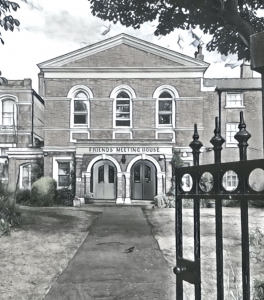
The Friends Meeting House, Brighton
‘A Woman’s Place is Turning the Tide‘ had originally been planned to take place at the Quaker Friends Meeting House, but they had backed out of hosting it a couple of days beforehand, weighed under by the usual bullying. A Woman’s Place were uncowed by this, organising another, larger venue and relocating the event to the waterfront.
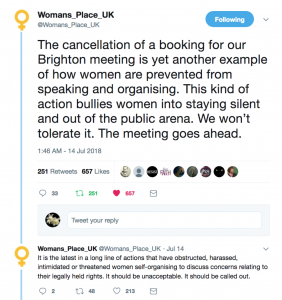
The new venue was the modern and gargantuan Jury’s Inn, overlooking the sea.
We knew that protestors were expected, and there they were. We could hear them as we approached, chanting the inevitable: ‘Transwomen are real women!’
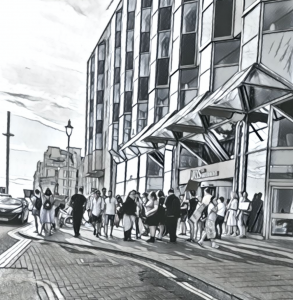
Transactivists, hotel guests & passers by outside Jury’s Inn
“No debate! No debate! Transwomen are real women,’ they cried.
‘Trans rights are human rights!’ They waved their placards.
‘Trans rights are not for debate,’ they called, earnestly, as we approached the building.
“No debate! No debate!
No debate! No debate!
No debate! No debate!”
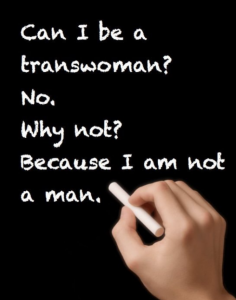
Transwomen are men
Transwomen are, of course, not women. Can I be a trans woman? No? Why not? Because I’m not a man. It really is that simple.
We all know what a woman is: we all came out of one.
We have words like masculine and feminine to help us describe the more ethereal aspects of how we perform gender; ‘man’ and ‘woman’ are biological descriptors. You can’t just take them – we need them. Women, and men too, need those words to describe our biology and how it affects our lives.
Trans people should have the same human rights as the rest of us. Obviously. Nobody I know has issues with that. Have you ever heard anybody say trans people shouldn’t have the same human rights as the rest of us? If I heard someone say that, I’d pull them up pretty sharpish, I can tell you that. Human rights are universal.
But trans rights do not automatically include the right to stop women talking about things that affect them. We get to talk about that. Trans rights do not over rule women’s rights. This is not a game of Top Trumps. It is entirely disingenuous to suggest that anyone wishing to discuss feminism and changes to the GRA wants to take away anybody’s human rights, erase people or deny their existence.
Sometimes I feel we are so close to agreeing on all this. Prescribed gender roles are harmful. As humans, our responses to gender are complex and diverse. We need to break down stereotyped ideas of how a boy or girl should behave. Why this obsession with appropriating the language of biology? How can a boy possibly be a girl unless we completely change the meanings of the words ‘boy’ and ‘girl’? And to spread the net a bit wider, those who don’t want to choose a pink or blue box but still want their seat on the trans-train can be non-binary, or gender fluid, some are demi-girls or demi-boys. The trans umbrella spreads itself wide. LGBTQIA? Everyone can be special! Kids as young as twelve or thirteen are declaring themselves asexual. FFS- you are literally 12! It’s quite normal not to fancy anybody at 12 , let alone not desire to indulge in rampant shagging- because YOU ARE A CHILD.
The belief that people can be born in the wrong body is akin to a religious issue. You may believe that we have culturally gendered souls that can slip into the ‘wrong’ body. I may call this sexist nonsense. Our disagreement on this no more means I am trying to erase you, or harm you, than my refusal to accept that god is a white-robed beardy bloke who lives on a cloud in the sky means I am trying to erase certain groups of Christians.
So there were they, waving their placards, chanting with excellent enunciation and full of righteous energy, and there were we, wanting to have a meeting and wondering if anybody was going to get punched this time.
“Transwomen are real women!
No debate!
No debate!””
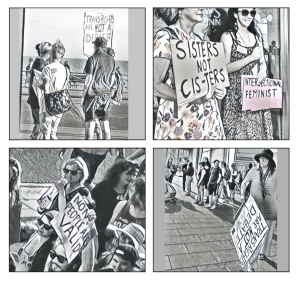
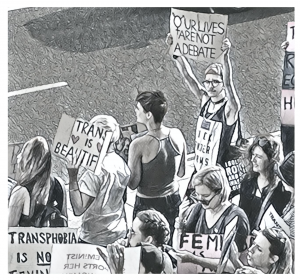
One of the protestors had a sign on their T shirt reading ‘Fuck Gender Norms’ and I wanted to shout, ‘Yes, I agree! Fuck gender norms, they’re bullshit, it’s all nonsense! Wear what you like! Love who you like! Express yourself! Be masculine; be feminine, be passive or assertive, have long hair or short; paint your face or not. It’s called having a personality. Challenge those sexist stereotypes, break those gendered barriers. Change things! You don’t belong in a box.’
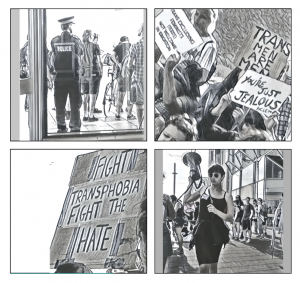
I’m fascinated by the protestors who turn up to events organised by gender critical women. Some people have said to me, don’t write about them, why even mention them, it’s just giving them attention. But to understand what’s going on, we need to try to understand them. How has this happened?
I believe in the power of protest. I’ve marched against bombs, wars, homophobia, rape, racism; against the poll tax, oppressive foreign regimes, corrupt banks, politicians and the meat industry. I’ve protested for the right to listen to loud music in a field and waved banners calling for the decriminalisation of drugs. I was actively involved in Greenpeace actions in my 20s. My politics are libertarian left. I have never been ‘the bad guy’ before and I don’t believe I’m the bad guy now.
Myself and other women want to talk about how changing attitudes towards gender and the redefining of words used to describe it affect the rights of women and children. We’re told that to do so is hatred. Me-from-the-past views this with horror. Women being told they can’t discuss their rights? The ground feminists had gained, lost so soon? It’s like one of the dystopian scifi novels I read so avidly in my teens. Oh the irony of being accused of erasing people by those who want lesbians to accept penises as female! The irony of being called regressive by those who think a feminine boy in a Frozen tutu should be encouraged to think he’s a girl!
Later on in the evening, the chant turned to ‘Non-binary is valid’, which must be a contender for the most ridiculous slogan in the global history of protest. We’re all bloody non-binary, with the possible exception of Barbie and Action Man- and they aren’t real. It would almost be endearingly funny if trans-ideology wasn’t resulting in young people becoming desperately unhappy – suicidal, as we are so often told- surgeons removing young women’s healthy breasts and minors being medicalised with off-label drugs. Most- but certainly not all- who transition are over the age of eighteen, but doctors have long known that the pre-frontal cortex of our brains doesn’t mature until we are at least in our mid twenties. Youngsters are impetuous. That’s one of the reasons their car insurance is so insanely high.
Most of the protestors are under 25. I feel maternally protective towards the narcissistic little blighters, although I know they hate me. I wonder if they’ve had a proper lunch.
For all the cries of equality, there is undoubtedly a hierarchy among the trans-identified and their ‘17 types of gender‘. Transwomen are at the top, naturally, their voices are loudest and they are the most listened to because they are men and we live in a patriarchy. Transmen seem mostly incidental, noted in the papers only when they give birth or occasionally when they grow a beard. At the bottom are actual women who want a shaft of the rainbow, the handmaidens of the trans movement, the ‘sisters not cis-ters’ who are happy to describe themselves as ‘cis’.
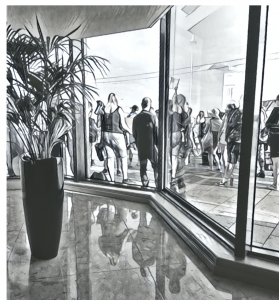
Michèle, never intimidated, took a leaflet with a smile. Someone put their foot in the revolving doors, just for a second, when I wouldn’t take the one held out to me. The door stopped for a moment, then seconds later we stepped into the cool, air conditioned, glass and marble lobby of the hotel.
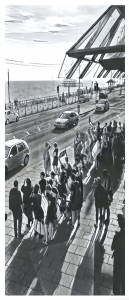 We registered in the lobby, where our bags were checked. Outside, a few guests perused the protestors as they began chanting ‘transmen are real men’.
We registered in the lobby, where our bags were checked. Outside, a few guests perused the protestors as they began chanting ‘transmen are real men’.
We milled off to the bar for a drink in the stunning air-con lounge. The space was huge and cool. I sipped hot coffee and slipped over to the window, where I could see the protestors down in the street below.
“I should have taken a leaflet,” I wail, angry with myself for being momentarily intimidated. Michèle gives me hers. It’s disappointing.
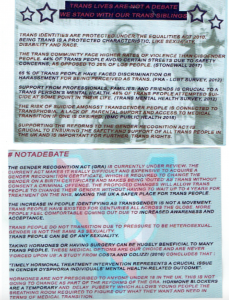
Debunking the leaflet
Firstly, we need to remember that sex is also a protected characteristic. Female-bodied people – aka women- have the right to their own spaces. We do not currently legally have to let boys change with girls; to let men into women’s refuges. We do not have to say that men are women. Yet.
As Helen Saxby pointed out later, in her talk, Penny Mordaunt (Minister for Women and Equalities) may well have assured us that the Equality Act won’t be affected by any changes to the law, but if you take the view that trans women are women it erases the sex class of women altogether.
There is no evidence that the UK trans community faces higher levels of violence than other marginalised groups.
There is a rich and detailed global history of LGB art and literature, even in cultures that punished or erased homosexuality. There is no history of transgender children. The Roman were keen surgeons who kept close records of their various achievements, which even included foreskin reconstruction. There is nothing to suggest that they even considered the idea of performing a ‘sex change’. It’s extremely hard to believe that nobody felt able to speak up about this until about 15 years ago and now suddenly thuosands of young people are ‘finding the words’ at last.
Discrimination is not a good thing. Women know all about it, and it isn’t something we chose to identify into, thank you very much, nor is it something we should be expected to have to identify out of. While I support your human rights, I will not call a man a woman and I do not have to believe in your gender fairy.
Support is essential for all of us, especially those of us going through crises or mental health issues. However, if you’re starving yourself, I’m not going to tell you you look better the thinner you are; if you’re self harming I’m not going to say ‘that’s a great way to let it out’. Supporting someone means more than blind acceptance of their beliefs.
The horror of child suicide has been used as a very effective silencing technique. Those who feel that mental health problems are caused by gender dysphoria rather than the other way around are dismissed as heartless and full of hatred for trans-IDd children. Yet the Tavistock and Portman GIDS clinic states that among children referred to the clinic “suicide is extremely rare”. Outside the story of American Leelah/Josh Alcorn, most of the very few young trans-IDd people that have taken their own lives had full parental support. The 48% suicide attempt myth has been debunked here – one study represented as interviewing over 2,000 trans people actually interviewed 27. A peer-reviewed study shows that post-transition suicides, and psychiatric inpatient care, are actually higher post-op than pre-transition. J. Michael Bailey, Ph.D and Ray Blanchard, Ph.D talk about the ‘transition or die’ myth here.
The GRA already gives trans people the right to ‘jump ship’ on their sex and have all records changed if they can show their intent is wholehearted and genuine. The leaflet describes it as ‘really difficult and expensive’. It costs £140, and those on low income receive help to pay. You can view the current process here. Changing the GRA so anyone can change all their documents- including their birth certificate- just by waving a wand causes all sort of problems from genealogy to criminal investigations.
I’m unsure what the writers of the leaflet mean when they speak of the ‘further trans rights’ they are seeking in addition to making self-identification viable in law. If a male can wake up one morning & legally declare himself female ‘just like that’ where else is there to go?
The last part of the leaflet says ‘hormones are not prescribed to anyone under 18 in the UK.‘ This is blatantly untrue. They are prescribed to children as young as twelve. See here. Even the NHS website says otherwise. “If your child has gender dysphoria and they’ve reached puberty, they could be treated with… synthetic (man-made) hormones that suppress the hormones naturally produced by the body.”
So the leaflets were full of sensationalist misinformation, or ‘alternative facts’, which was disappointing but not entirely surprising.
The Meeting
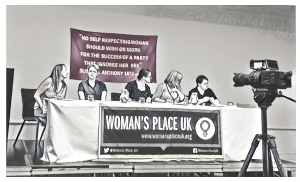
The Panel – left to right: Helen Saxby, Kathleen Stock, Phillipa Harvey, Ruth Serwotka, Gill Smith
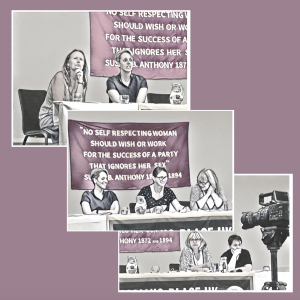
Helen Saxby, Kathleen Stock, Phillipa Harvey , Ruth Serwotka, Gill Smith
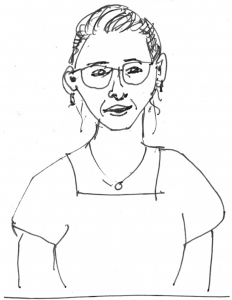
Phillipa Harvey by Michèle M
Phillipa Harvey‘s welcome was met with applause; the bar and the aircon were noted and praised. She thanked the hotel for hosting us at short notice.
“The term TERF will not be tolerated- this is abuse of women. Please be aware of how others in the room will feel as you are speaking. I’m angry that in defending women’s hard fought for rights we are being called transphobic.
Changes in law matter. Thank you for caring how the changes in law matter… for caring to attend this meeting.”
Harvey introduced the first speaker of the evening.
Helen Saxby
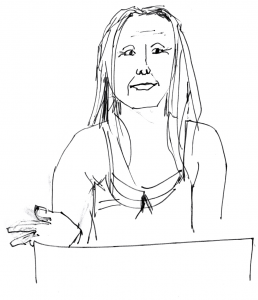
Helen Saxby by Michèle M
The first speaker was Helen Saxby, a feminist writer and blogger. Saxby told us that she wanted to talk about “how we’ve got where we are and why we feel angry about it.”
Saxby reminded us that the government consultation has now been launched and that it will be the first chance for women to have a say concerning changes to the GRA (Gender Recognition Act). You can take part in the government consultation about the GRA or just learn more about it here.
She spoke of the legal fiction put into law when the GRA was first introduced in 2004, back when nobody was expected to say that transwomen actually were women, and how it was supposed to “help alleviate the gender incongruence of a very small group of people so they could live more happily”. She spoke of the abuse women received on Twitter if they dared to say that transwomen weren’t women.
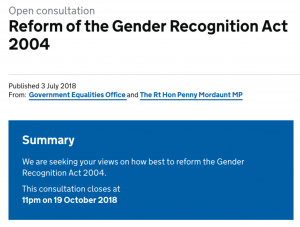
‘What is at stake is the actual meaning of the word woman.’
Helen spoke of how the phrase ‘Transwomen ARE women’ is used to put a stop to talk of women’s rights. “It’s like a football chant,” she observed wryly. Saxby pointed out that calling transwomen women used to be ‘a way of being an ally; a way to be nice… not hurting their feelings… just a matter of courtesy’, but what it has become is ‘a political slogan’.
Over the years, she said, the number of transactivists groups have grown, and they’ve been talking to governments, the NHS and other organisations and any argument has been shut down. It now seems transphobic to say transwomen are men.
“Women are easy to ignore, feminist women are particularly easily ignored and lesbian feminist women are easiest to ignore.”
Saxby spoke of the Allsorts Schools Toolkit and how it discriminated against girls, and Transmedia Watch who work to ensure that male transgender crimes are reported as female crimes but if the man later takes his life it will be reported in the press as a trans suicide.
“It’s quite clearly unfair in sport,” she added, “when a male bodied person competes against a female... In every area where trans rights have been pushed for, it is women and girls who lose out.”
“Some gay men are beginning to realise what transgender ideology says about their sexuality,” observed Saxby, “and that it’s not really what they want either.” She said she hoped gay men would support their lesbian sisters who looked after them during the AIDS crisis.
“The mantra ‘transwomen are women’ is no longer a matter of courtesy, it’s a political point. It’s nothing to do with transphobia, bigotry or hatred… I am being bullied by a political dogma that I don’t agree with. It’s my political right to say no to that dogma- and I would like everybody here to say no to that dogma.”
A resounding cry of “No!” and applause came from the audience.
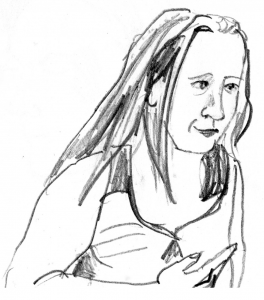
Helen Saxby by Michèle M
“If you take the view that transwomen are women… what it does is it erases the sex class of women. If women as a female sex class can contain males it is no longer a female sex class and this means that the characteristic ‘sex’ in the Equality Act has actually disappeared simply by making it meaningless.”
If the suggested change to the GRA takes place, “the law of the land would be telling us that we actually choose our own subordination.”
“Let’s get everybody we know to look at the consultation and fill it in. Please fill in the consultation and give women a voice.” she concluded.
I have only captured a few of Saxby’s points in this piece: she has blogged about her talk at the meeting and I thoroughly recommend that you read about it here, on her excellent blog ‘Not the News in Briefs’ You can also hear her talk on YouTube here.
***********
Gill Smith
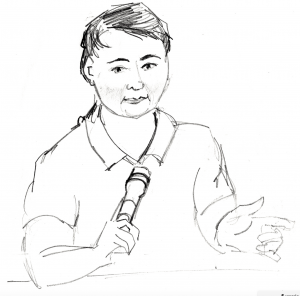
Gill Smith by Michèle M
“I wanted to show my face and say I transitioned and detransitioned.”
Smith said she hears the mantra ‘no debate’ and sees it everywhere. Some LGBT ideas are taking precedence and others are being dismissed. Only certain views are allowed to be expressed, and there are those who would shut her voice down.
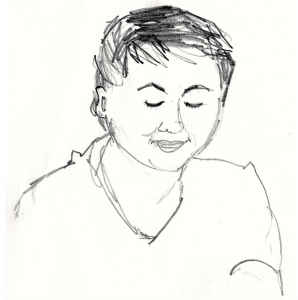
Gill Smith by Michèle M
“I’m going to talk about my own experience and the number of young lesbians I see calling themselves trans everywhere I go now… I think that must be questioned. I’m sticking up for my own community, for younger lesbians. I thought of myself as trans at one point… I started medical transition; a diagnosis of Gender Identity Disorder. I took cross sex hormones for almost four years. I spoke to a couple of surgeons about breast removal: this was 2006 and it was incredibly rare…. I don’t pretend it’s an easy issue… It’s a serious issue especially when we’re talking about teenagers and their bodies.”
Gill told the audience how she was a confident child and a ‘tomboy’ growing up. She thinks she might have identified as a transboy if the idea had been around.
“If my mum had took me to the doctor I’d have been asking for puberty blockers.”
After realising she was attracted to girls, she was bullied and began having panic attacks. She received a gender identity disorder diagnosis, which she says her mother did not agree with.
‘I separated my mind from my body,’ she told us.
Smith moved to London at the end of the 90s, binding her breasts and determined to transition. She is adamant that she didn’t get much help from the organisations that are meant to help young lesbians. Smith pointed out that even if scientists looked at her brain and found it was different – “which it isn’t,” – it doesn’t mean you need to change the body in an attempt to match the two. She reminded the audience that male and female are biological categories; that biological sex is a material category.
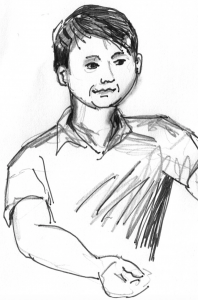
Gill Smith by Michèle M
“A female is supposed to be feminine and heterosexual. You’re seen as abnormal and not woman enough. I hope lesbians in particular don’t forget that we have historically been medicalised, pathologised and fetishised… I hope we don’t forget this.”
There will be more and more young women detranstitioning in the near future, Gill believes. Wanting to send a message to girls and teenagers that you can have short hair, wear clothes that you feel comfortable in and still be female, she asserted that that it isn’t progressive for young women to be constricting themselves in new boxes when they should be smashing the boxes. She finished by telling gender-questioning girls and young women is that if they want to speak to anyone there are always women who are listening.
Gill has been speaking out about her transition experience for a few years now and says she is happy to have received a lot of support from other women. She finished by thanking A Woman’s Place for giving her a chance to share her story.
“You’re a woman and the word woman belongs to you.” concluded Smith. “You don’t have to change your body… go out and change society.”
You can hear Gill’s talk on YouTube here.
Kathleen Stock
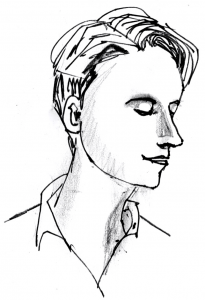
Kathleen Stock by Michèle M
Kathleen Stock is an academic at the University of Sussex , where “…we argue about the rights and wrongs of social arrangements: we have opinions but try to back them up with reasoned argument.”
“I’m clear, personally, that I completely support the rights of trans people to live their lives, without violence, harm or discrimination.” stated Stock at the outset of her talk.
“I’m also keen to distinguish between transactivists and trans people.” Stock referred to transactivist organisations as “rich, well connected and politically powerful’. She reminded us that not all trans people support the aims of, or agree with, these organisations.
Conflicts of interest occur between groups when giving one group something takes something important away from another group. Stock said she disagreed with transactivists who claim that there is no conflict of interest between trans rights and women’s rights if transwomen are recognised as ‘literal women’. If same-sex spaces for females- places where they undress or sleep- are reduced, it potentially reduces females’ safety from sexual violence. Likewise if we give females political or media representation to transwomen, or places in female sports, the result is limited representation for females.
“If trans women are literally women, not just legally but in every possible context… that does nothing less than force society into a complete re-understanding of what it is to be a woman, and obviously that has an impact on the biological females who were already occupying that category. So it’s perfectly ok for us to talk about that because it has an impact on our lives”
Stock said her writing had been met with ‘aggressive, angry public responses’ from fellow academics and is told she is causing ‘harm and even violence’. She is adamant that she does not claim that transwomen are especially violent, just that they are biologically male and it is important to recognise patterns of male violence.
Criticised for not being ‘kind and inclusive’, Stock observed that these expectations are gendered.
“I’m supposed to care that I’m not being kind because I’m a woman: no one tries that shit on men!”
Told that she’s playing ‘intellectual games’ she notes that she does not consider this debate to be a ‘fun game’ and that the criticisms she receives are personal rather than academic. Normally, she says, you engage with arguments, not character. There have, she informed us, been public protests about her on campus.

Kathleen Stock by Michèle M
‘The aim is to make me feel ashamed.. socially isolate me from potential supporters… and the ultimate aim to get me to stop talking… you’re told you’re evil, you’re told you’re confused, you’re not kind, you’re causing harm.. It’s particularly aimed at females…. In my case it hasn’t worked. I feel no shame whatsoever in anything I have written.”
This was greeted with cheers and applause from the audience. Kathleen went on to say that she sees men saying or writing similar things to herself but they do not receive the same damning response. Academics only feel comfortable taking privately or using pseudonyms, she added, saying she had lost count of the number of emails of support she had received from fellow academics but most said they ‘can’t face the onslaught’ of speaking openly.
Stock observed that some academic areas where proper discussion, analysis, and observation seem currently lacking are Law, Medicine & Biology, History and Psychology. She spoke compellingly about the importance of proper debate and research in these areas and how we need ‘public clarification of the fact that law cannot change biology.”
“Some people believe hormones can make transwomen into women: that’s not true. If academics don’t start saying this more loudly the public will get more and more confused…. if we can’t talk about female health and reproduction then we are lost.’
Speaking of how Stonewall promotes the rewriting of history; Kathleen talked about how the Stonewall riots have been rewritten to erase lesbian instigator Stormé Delaverie. Marsha P Johnson, a self-described gay man and drag queen who arrived after the riot had started, has been posthumously ‘transed’ and credited with starting the riots.
“I would have thought historians who cared about truth should be getting on to that,” she added, observing that ‘proper academic scrutiny’ is needed when it comes to statistics about transwomen’s lives, rather than the phone polls and internet surveys carried out by organisations like Stonewall. Studies should ideally be carried out by someone neutral: we need to know where the statistics come from and who funded them.
Stock spoke of the importance of philosophy in discussing these issues. It is a human right to be free of violence but not necessarily through giving transwomen access to women’s spaces. We need to talk about female bodies and experiences because ‘if we can’t name our own bodies we can’t name our own oppression’.
Can the category of lesbians include a pre-op man with a penis?
‘Lesbians like myself say no,” asserts Stock, to the general agreement of her audience, adding, “this isn’t because I am being mean or unkind.’
Academics need to talk, because ‘facts matter, the truth matters’ especially in the face of ‘wild, inaccurate, confused claims and theories’ which will be accepted as truths if no-one is there to correct them.
Kids online are living in a climate of suffocation, terrified of saying the wrong thing. They feel stifled and frightened… ‘herding and groupthink’ is developing online. They need to see academics show it’s ok to speak out and show how to deal with disagreement.
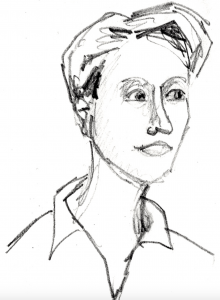
Kathleen Stock by Michèle M
Fascistic tendencies develop in society if no one can speak out. Stock referred to the harassment of A Woman’s Place, threats of violence and the recent bomb threat. Her own email account had been hacked that morning. Of academics she concludes:
‘Quite frankly, they need to woman up!’
Kathleen- now Professor Stock – has published her notes for her talk at A Woman’s Place here. Again, I thoroughly recommend you read the whole piece yourself. You can view her talk on YouTube here. She has also written in the Economist and other publications: this thread on her Twitter links to many of her inspiring articles.
**********
Ruth Serwotka
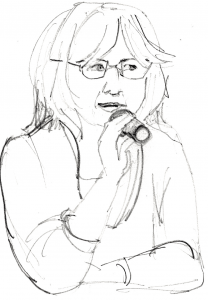
Ruth Serwotka by Michèle M
‘It’s been quite a week…. every week is quite a week in the land of gender identity,’ began Serwotka, speaking of how the Friends’ Meeting House had changed their mind about hosting the meeting. She asked us to please give the organisers a clap for ensuring the meeting went ahead, and we enthusiastically complied.
In a darker moment, she spoke of the ‘culture of intolerance’ and referred to a picture doing the rounds online, a picture she had been sent, the silhouette of a woman entitled ‘Kill TERFs’.
‘Freedom of speech matters, our right to free assembly matters, women matter.’
To loud applause and cheers, Serwotka referenced the letter from Women’s Place U.K, signed by so many and published in the Morning Star, and also the recent protest at Pride as progress that had been made in asserting women’s rights.
Women are not making progress, we are moving backwards, said Ruth. She spoke of how, in the poorest communities in the UK, women are now more likely to die at a young age than their mothers were. She pointed out how there will be fewer women in parliament if women’s shortlist’s are open to men.
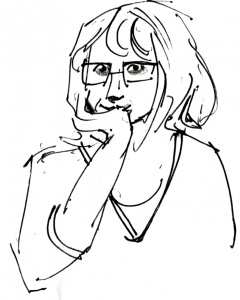
Ruth Serwotka by Michèle M
‘No mainstream political party supports us’ she observed, chillingly. “We do not have equal pay fifty years after the Equal Pay Act.”
‘We must never forget that every week more than two women are murdered in this country, which is why we need services that are female centred and protect the rights of women and girls.’
The Home Office, observes Serwotka, says violence against women and girls is a serious crime, which has a negative effects on our economy, our health service & our criminal justice system.
We’ve had a lot of patronising statements released in the last few weeks about how women have been ‘very silly and got our knickers in a twist’ when expressing concerns about the effects of changes to the GRA. These concerns, she continued, are very real and the changes are more than ‘a little administrative tidying up’.
Serwotka spoke of how in August 2015 Stonewall requested that the government removed single sex spaces from Equality law, without consulting women, but Stonewall is now denying they ever requested that. This is ‘a repositioning and a complete hogwash’. She was met with cheers when she called for Stonewall to be held to account.
We must remain vigilant and respond to the consultation.
Ruth pointed out the importance of upholding the right of women to have their own spaces in law, pointing out that rape crisis centres, counselling and domestic violence services all need protecting; there should also be single sex wards in hospitals and there should be female only prisons.
“We think protecting female prisoners who are very vulnerable is a really important thing that we should continue to uphold as a civilised society.”
Serwotka added that women should have the right to request a female doctor for certain services, and that single sex carers should be available for the elderly. High street changing rooms should have single sex changing rooms where women and girls are ‘not open to the male gaze of anyone who says they are transgender’ and toilets should also remain single sex, especially in schools. She also spoke of the right of women and girls to have their own spaces in sports and competition.
‘As women and girls we want a fully informed discussion and in a democratic society we have that right to meet, to discuss and put to our opinions forward’
You can see Ruth Serwotka’s full speech here on YouTube.
**********
There were lots of questions and observations from the floor. The microphone was passed around, and audience members were given two minutes to speak. The atmosphere was excited as many people expressed their support for the speakers and the desire to carry on the discussion.
One woman said she was ‘here as a cis-gendered person’ and spoke of there being “so much fear and anger in the room.”
A few women booed at this, but Phillipa Harvey put them straight.
“We need to have this discussion and listen to each other. We have made this meeting an open meeting. We must listen to each other. Show respect.”
Another person observed that ‘TERFs are like a mouldy smell and they spread,’ which was not the most inspiring observation of the evening.
A bloke in a skirt and a T shirt stood up and said he’d been a cross-dresser most of his life and didn’t want to interfere with women’s rights. This was much more positively received.
There were many other people who spoke up, but my notes get more and more garbled from here on and this seems like a good place to leave my report of the meeting.
Phillipa concluded:
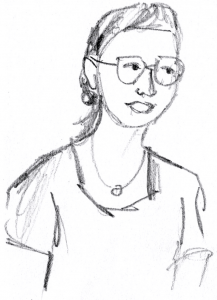
Phillipa Harvey by Michèle M
“This conversation needs to continue happening.. I would like to call on everyone who has their hand in the air. We just don’t have the time.
It was clear we need to have a discussion. Sometimes it becomes quite heated but this meeting will bring us forward… thank you for bringing your thoughts, your agreements and disagreements to this meeting.”
Harvey told us the hotel had had problems with guests resenting the demonstrators, and some people people had refused to pay their bills. She told us that there were demonstrators at both the front and back of hotel- exercising their democratic right to demonstrate- and that exiting from the car park might be best way to exit.
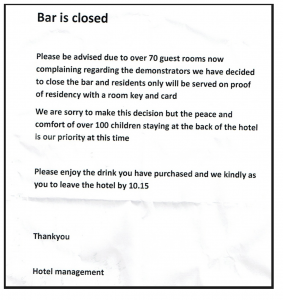 Michele and I made our way up to the hotel bar for a drink. Someone said Julie Birchill had brought everyone a round, but I never found out if that was true or not. If she did, we missed it! We sipped our drinks and chatted with some of the other women, but after about half an hour we were passed a piece of paper with an announcement from the hotel.
Michele and I made our way up to the hotel bar for a drink. Someone said Julie Birchill had brought everyone a round, but I never found out if that was true or not. If she did, we missed it! We sipped our drinks and chatted with some of the other women, but after about half an hour we were passed a piece of paper with an announcement from the hotel.
A few activists were still outside, talking with guests and passers by. We downed our drinks and left.
“I’m buggered if I’m leaving through the car park,” I scowled at Michele, and she agreed.
Transphobes aren’t feminists!” A pair of hands waved a piece of cardboard at us through the tall glass panels as we headed for the exit.
The voices became louder as we passed out through the doors into the cool Brighton evening air, although the activists’ numbers had dwindled. A seagull pecked nonchalantly at a piece of bread. Several police officers were keeping a wary eye on things but no violence broke out.
“Transphobes are not welcome here!” an activist chanted as we stepped onto the pavement.
“Fight back, fight back!” chorused her friends.
“Non-binary people are valid!
Non-binary people are valid!”
“No debate! No debate!
Fight back, fight back!
No debate, no debate!
No debate!
No debate.”
No debate.
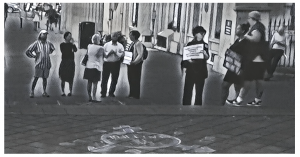

It’s not “Freedom of speech” that activists are trying to prevent. It is worse – it is ‘Freedom of thought’ they want to stop.
Pingback: YES, BUT WHAT DO THEY ACTUALLY WANT ??? -Lily Maynard